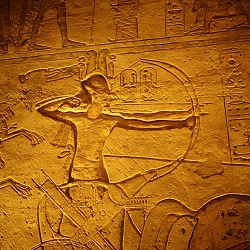
This town in Syria, on the river Orontes, was situated at the meeting point of the main routes from Egypt to Northern Syria, Asia Minor and the Euphrates. Close by, in 1285 BC, the famous battle for control over Syria took place between the Egyptian army under Ramesses II and the Hittite army under Mutawallis. The battle could have been disastrous for the Egyptian army. Mutawallis managed to trick the Egyptian army leaders into believing that the Hittites were still in Northern Syria, so that the Egyptian army, consisting of four divisions, headed northwards along the Orontes. After the first division with Ramesses II at its head had set up camp to the north west of Kadesh, the Hittite forces, which were hiding behind Kadesh, attacked the flanks of the second division. The third and fourth Egyptian divisions were still too far away to come to their assistance and the second division was destroyed. The few survivors fled to the Egyptian camp, followed by Hittite chariots. The camp was attacked by the Hittites and the first division also suffered heavy losses. The king fled in the chaos, probably northwards. Just then, an Egyptian unit that had been held in reserve near Naharina appeared from the west, thus preventing a total defeat. Under the cover of night, the survivors from the first two divisions joined up with the third and fourth divisions who had arrived in the meantime. The next morning, a letter from Mutawallis arrived, perhaps with an invitation to the decisive battle. However, the Egyptians decided to withdraw to the south and to avoid further battles. Although this was not a total defeat for Egypt, seeing as the Hittites did not succeed in gaining complete control over the area, it was certainly not a victory. However, the return to Egypt was presented as a moral victory with the king 'returning in peace with his infantry and chariots', and the role of the king, which was anything but valiant, was transformed into heroism with the king forcing the enemy to flee or to freeze in fear with the help of divine powers. In its expression of the direct relationship between the king and the god, the 'prayer to his father Amun' apparently spoken by Ramesses in the heat of battle is an example of the type of personal piety favoured in the New Kingdom.